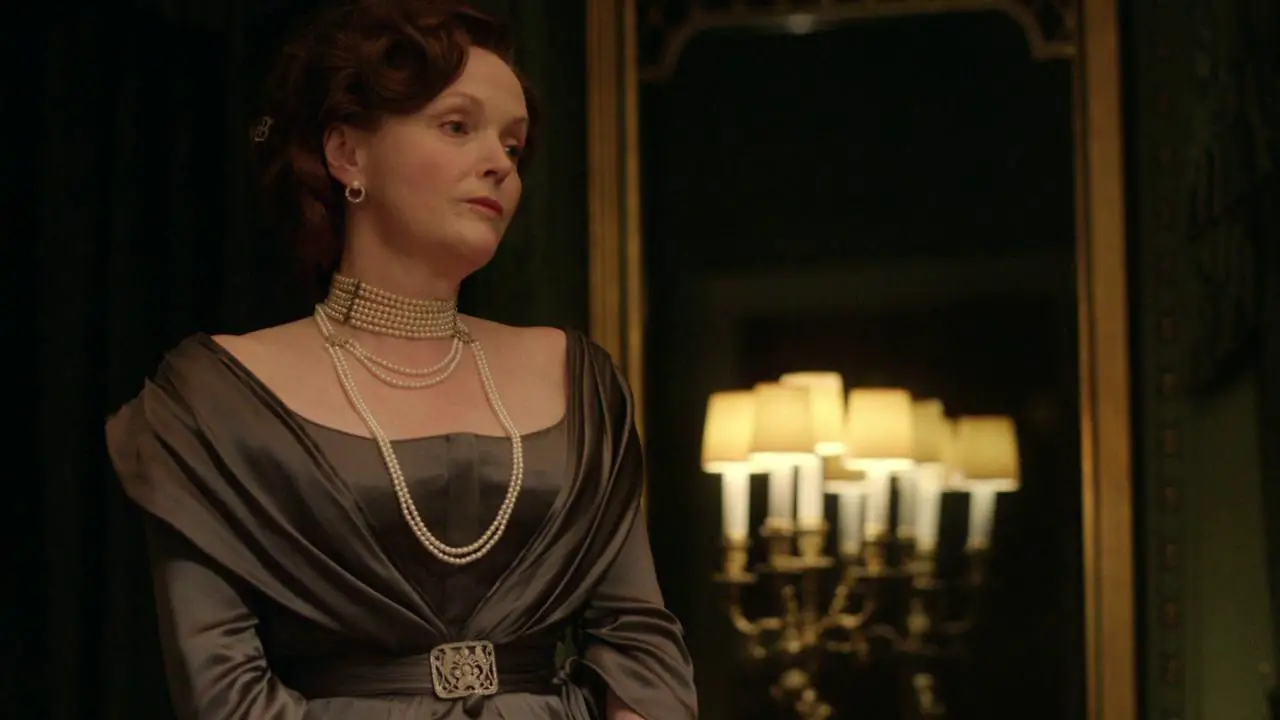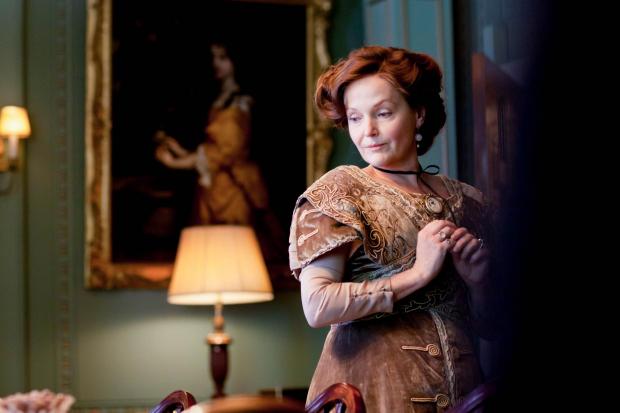In this article, we delve into the compelling character of Mrs. Birling and the profound impact she has in the renowned play.
As a key figure in J.B. Priestley’s masterpiece, “An Inspector Calls,” Mrs. Birling’s quotes provide profound insights into her personality, beliefs, and the prevalent themes throughout the narrative. With her unwavering sense of superiority and adherence to societal norms, Mrs. Birling embodies the rigid class hierarchy and moral hypocrisy of the time. Through her memorable quotes, we witness her arrogance, dismissive nature, and callousness towards others.
These quotes shed light on the themes of social responsibility, gender dynamics, and the detrimental effects of a judgmental society. By examining Mrs. Birling’s notable quotes, we gain a deeper understanding of the play’s messages and the complexities of human behavior.
Join us as we explore the intriguing words of Mrs. Birling, revealing the layers of her character and the profound themes that resonate within the timeless narrative of “An Inspector Calls.”
An Inspector Calls by J.B. Priestley is a classic play that tackles important themes such as social responsibility, gender roles, family dynamics, and class conflict.
One of the most memorable characters in the play is Mrs. Birling. As the matriarch of the Birling family, Mrs. Birling has a significant impact on the play’s events and themes.
Her quotes are not only memorable but also reveal insights into her character and the attitudes of the time in which the play is set.
In this article, we will explore the most notable quotes of Mrs. Birling, analyzing their significance and impact on the play’s themes.
Understanding Mrs. Birling’s Character
To fully appreciate Mrs. Birling’s quotes, it is important to understand her character. From the play’s onset, it is clear that Mrs. Birling is a proud woman who values her social status. She is also strict and judgmental, quick to criticize others for their behavior.
However, there is more to Mrs. Birling’s character than just her social status and attitude towards others.
As a member of the upper class, Mrs. Birling has had a privileged life. She has never had to worry about money or struggle to make ends meet. This has shaped her worldview and made her believe that those who are less fortunate are responsible for their own misfortunes. Her dismissive attitude towards the poor is not just a reflection of her lack of empathy, but also a result of her privileged upbringing.
The Role of Mrs. Birling in the Play
Mrs. Birling’s role in the play is significant. As the wife of a wealthy businessman and the mother of two children, she represents a particular class and social status. Her views and attitudes reflect the values of her class, which includes a sense of superiority and detachment from the struggles of the lower classes.
Her behavior and beliefs are challenged by the inspector’s questioning, and this conflict reveals the deeper themes of the play.
One of the key themes of the play is the idea that we are all connected and responsible for each other. Mrs. Birling’s dismissive attitude towards Eva Smith and her belief that she is not responsible for her death are challenged by the inspector’s investigation. The inspector’s questioning reveals that Mrs. Birling’s actions, along with those of her family members, contributed to Eva’s death.
Mrs. Birling’s Social Status and Attitudes
Mrs. Birling’s quotes reflect her social status and attitudes towards others. When discussing Eva Smith, she dismisses her as “a girl of that sort” and blames her for her own misfortunes. Her dismissive attitude towards the poor demonstrates her lack of empathy and understanding for those who are less fortunate than herself. Her quotes also reveal a sense of entitlement and superiority, such as when she says,
“I accept no blame for it at all.”
This statement reflects her belief that her social status absolves her of any wrongdoing or responsibility.
However, as the play progresses, Mrs. Birling’s attitude begins to change. She starts to realize the impact of her actions and the harm caused by her judgments. This is evident in her quote,
“I’m sorry she should have come to such a horrible end. But I accept no blame for it at all.”
While she still believes that she is not responsible for Eva’s death, she expresses regret for the way things turned out.
The Evolution of Mrs. Birling’s Character
The evolution of Mrs. Birling’s character is an essential aspect of the play. Through the inspector’s questioning and the revelation of each family member’s involvement in Eva’s death, Mrs. Birling begins to question her beliefs and attitudes. Her character evolves as she begins to recognize the impact of her actions and the harm caused by her judgments. This evolution is evident in her quotes, such as when she says,
“I’m sorry she should have come to such a horrible end. But I accept no blame for it at all.”
The evolution of Mrs. Birling’s character also highlights the importance of empathy and understanding. As she begins to recognize the impact of her actions, she starts to understand the struggles of those who are less fortunate than herself. This is evident in her quote,
“I didn’t know it would end like this. I didn’t understand.”
This quote reflects her newfound understanding of the impact of her actions and her recognition of the importance of empathy and understanding.
You can also read: Empath Quotes for Connecting with Your Emotions
Mrs. Birling’s Most Notable Quotes
Mrs. Birling is a complex character in J.B. Priestley’s play, “An Inspector Calls”. Her notable quotes reveal her beliefs and attitudes towards various themes, including social responsibility, gender roles and expectations, family dynamics, and class and status. Let’s take a closer look at each of these themes.
On Social Responsibility
One of Mrs. Birling’s most notable quotes is when she says,
“I think it’s my duty to keep the family together.”
This statement reflects her sense of duty and responsibility towards her family. However, her interpretation of this responsibility focuses solely on maintaining appearances and preserving her family’s reputation. Her quote also reveals a lack of understanding of social responsibility and the impact of one’s actions on others.
Social responsibility is an important concept that refers to the idea that individuals and organizations have a duty to act in the best interests of society as a whole. This includes being aware of the impact of one’s actions on others and taking steps to minimize negative consequences. Mrs. Birling’s quote demonstrates a narrow-minded perspective that fails to consider the wider implications of her actions.
On Gender Roles and Expectations
Another notable quote from Mrs. Birling is when she says,
“Girls of that class…we seldom really do.”
This quote reflects Mrs. Birling’s beliefs about gender and class. She believes that people from lower classes, particularly women, are inferior and less capable. Her quote also reveals the societal expectations of the time, where women were expected to conform to specific roles and behaviors.
Gender roles and expectations have evolved over time, but during the early 20th century, women were expected to be submissive, obedient, and focused on domestic duties. Women from lower classes were often viewed as inferior and were not afforded the same opportunities as their wealthier counterparts. Mrs. Birling’s quote reflects these attitudes and demonstrates her narrow-minded perspective.
On Family Dynamics
Mrs. Birling’s quote, “I think you did something terribly wrong that you’re ashamed of, and now you’ve decided to put the blame on the young man who, as you say, has no parents, and whose story you’ve told us,” reveals her perception of family dynamics. She believes in protecting her family at all costs, even if it means deflecting blame onto others. Her quote also suggests that she is aware of her children’s faults and is willing to overlook them to preserve the family’s reputation.
Family dynamics are complex and can be influenced by a range of factors, including social status, wealth, and upbringing. Mrs. Birling’s quote demonstrates her willingness to prioritize her family’s reputation over individual accountability. This attitude can have negative consequences, as it can lead to a lack of accountability and a failure to address underlying issues.
On Class and Status
Mrs. Birling’s quote,
“As if a girl of that sort would ever refuse money!”
reveals her beliefs about social class and the attitudes of the time. She is dismissive of Eva’s refusal of money, demonstrating her belief that people from lower classes are inclined to accept handouts. Her quote also suggests that she is unaware of the struggles and challenges faced by those who are less fortunate than herself.
Social class and status have long been important factors in society, influencing access to resources and opportunities. Mrs. Birling’s quote reflects the attitudes of the time, where people from lower classes were often viewed as inferior and were expected to accept their place in society. However, this attitude fails to recognize the systemic barriers and challenges faced by those from disadvantaged backgrounds.
Overall, Mrs. Birling’s notable quotes reveal her complex character and the attitudes and beliefs prevalent during the early 20th century.
While some of her views may be outdated or narrow-minded, they provide valuable insights into the social and cultural context of the time.

The Impact of Mrs. Birling’s Quotes on the Play’s Themes
The play “An Inspector Calls” by J.B. Priestley explores several themes, including social responsibility, gender inequality, family loyalty and betrayal, and class conflict. The character of Mrs. Birling, a wealthy and influential member of society, plays a significant role in the development and exploration of these themes. Her quotes throughout the play provide insight into the attitudes and beliefs of the upper classes and their impact on society.
The Theme of Social Responsibility
Mrs. Birling’s quotes about social responsibility reveal the societal attitudes towards this concept. Her belief that she is only responsible for her family’s well-being and reputation reflects the entitlement and detachment of the upper classes. However, her lack of concern for the welfare of others is not limited to those outside of her family. She also demonstrates a lack of empathy and an unwillingness to acknowledge the impact of one’s actions on others. Her quotes reveal the dangers of a society that values individualism over the well-being of the community as a whole.
For example, when discussing the suicide of Eva Smith, Mrs. Birling states,
“I accept no blame for it at all. The girl had only herself to blame.”
This quote demonstrates a complete lack of empathy for the struggles and challenges faced by those from lower classes. It also reflects the belief that those who are not as fortunate as oneself are responsible for their own misfortunes.
This attitude perpetuates a cycle of poverty and inequality, as it absolves those in power of any responsibility to address the systemic issues that lead to these problems.
The Theme of Gender Inequality
Mrs. Birling’s quotes about gender and class reveal the prevalent stereotypes and expectations of the time. Her dismissal of women from lower classes and the belief that they are inferior reflects the societal attitudes and expectations. Her quotes reveal the challenges faced by women and the limitations placed upon them, particularly those from disadvantaged backgrounds.
For instance, when discussing Eva Smith’s pregnancy, Mrs. Birling states, “Girls of that class…” This quote demonstrates the classist and sexist beliefs that were common during the time period. It also reveals the double standards that existed when it came to gender and sexuality. Women were expected to adhere to strict moral codes, while men were given more leeway in their behavior. Mrs. Birling’s quotes highlight the need for society to challenge these harmful stereotypes and expectations.
The Theme of Family Loyalty and Betrayal
Mrs. Birling’s quotes about family dynamics reveal the tension between the desire to protect one’s family and the cost of doing so. Her willingness to overlook her children’s faults and deflect blame reflects the sacrifice of individuals for the good of the family. However, her quotes also reveal the dangers of this mentality, as it can lead to betrayal and a lack of accountability.
For example, when discussing her son Eric’s drinking problem, Mrs. Birling states,
“I don’t suppose for a moment that we can understand why the girl committed suicide. Girls of that class…”
This quote demonstrates her willingness to protect her family’s reputation at the expense of acknowledging the harm that they may have caused. It also reflects the danger of prioritizing loyalty to one’s family over the well-being of others.
The Theme of Class Conflict
Mrs. Birling’s quotes about social class and status reveal the tension and conflict between the upper and lower classes. Her dismissive attitude towards those from lower classes reflects the societal attitudes and beliefs. Her quotes demonstrate the lack of empathy and understanding for those who are less fortunate and the impact of this attitude on social harmony.
For instance, when discussing the possibility that Eva Smith may have been pregnant, Mrs. Birling states,
“As if a girl of that sort would ever refuse money!”
This quote demonstrates the classist beliefs that were prevalent during the time period. It also reveals the lack of understanding and empathy for those who may be struggling financially. Mrs. Birling’s quotes highlight the need for society to address the systemic issues that lead to class conflict and inequality.
In conclusion, Mrs. Birling’s quotes throughout the play “An Inspector Calls” provide insight into the attitudes and beliefs of the upper classes and their impact on society.
Her quotes reveal the dangers of individualism, harmful stereotypes and expectations, the sacrifice of individuals for the good of the family, and class conflict.
These themes are still relevant in contemporary society and highlight the need for ongoing efforts to address systemic issues and work towards a more equitable and just society.
Analyzing Mrs. Birling’s Quotes in Context
The Historical Context of An Inspector Calls
To fully understand the significance of Mrs. Birling’s quotes, it is essential to analyze them in the context of the time in which the play is set. An Inspector Calls is set in 1912, a time of significant changes in British society, including the suffragette movement, the rise of the working-class, and the beginning of the First World War.
The suffragette movement, which aimed to secure voting rights for women, was gaining momentum in the early 1900s, and Mrs. Birling’s dismissive attitude towards Eva Smith’s request for help reflects the prevailing patriarchal attitudes of the time.
The rise of the working-class also played a significant role in shaping Mrs. Birling’s character. Her privileged upbringing and social status make her unable to empathize with the struggles of the working-class, which is a recurring theme in the play.
The impending First World War also looms over the play, adding to the sense of urgency and instability. The war would lead to significant changes in British society and would challenge many of the traditional values and beliefs that Mrs. Birling represents.
The Influence of J.B. Priestley’s Views on Mrs. Birling’s Character
J.B. Priestley was a socialist who believed in social equality and the importance of individual responsibility. He used his plays to criticize the societal norms and values that he believed were harmful. Mrs. Birling’s character reflects the attitudes and beliefs that J.B. Priestley criticized in his work.
Her quotes reveal the dangers of entitlement and detachment from others, which were common among the upper classes at the time. Mrs. Birling’s belief that her family’s reputation is more important than their responsibility towards others is a clear example of this.
Priestley’s views on the importance of empathy and social responsibility are also evident in Mrs. Birling’s character arc, as she is forced to confront the consequences of her actions and the impact they have on others.
Comparing Mrs. Birling’s Quotes to Other Characters’ Perspectives
Comparing Mrs. Birling’s quotes to other characters’ perspectives reveals the conflicts and tensions present in the play. For example, Sheila, Mrs. Birling’s daughter, demonstrates empathy and understanding for Eva Smith, and recognizes the impact of her family’s actions on others.
Her perspective stands in stark contrast to her mother’s dismissive attitudes.
Additionally, the Inspector’s views on social responsibility and the interconnectedness of society also challenge Mrs. Birling’s beliefs. His questioning of her actions and beliefs leads her to confront the reality of her actions and the harm they have caused.
In conclusion, analyzing Mrs. Birling’s quotes in the context of the historical setting, J.B. Priestley’s views, and other characters’ perspectives adds depth and complexity to her character. It highlights the societal attitudes and beliefs that she represents and the conflicts and tensions that arise from them.
Conclusion: The Significance of Mrs. Birling’s Quotes in An Inspector Calls
The Lasting Impact of Mrs. Birling’s Words
Mrs. Birling’s quotes have a lasting impact on the play’s themes and message. Her dismissal of social responsibility, entitlement, and detachment from others reflect the attitudes and beliefs that J.B. Priestley criticized in his work. While Mrs. Birling may not be a sympathetic character, her quotes reveal the societal attitudes and beliefs of the time and contribute to the play’s exploration of important social issues.
The Role of Mrs. Birling in the Play’s Message and Legacy
Mrs. Birling’s character and quotes contribute to the play’s message and legacy. An Inspector Calls remains a relevant and powerful play today because it explores issues that are still significant, such as social responsibility, gender roles, and class conflict. Mrs. Birling’s quotes contribute to the message of the play by revealing the dangers of entitlement and detachment from others and the importance of empathy and social responsibility.





